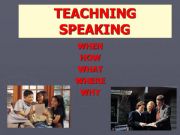
TEACHNING SPEAKING
Several approaches to identifying speaking content
1) topics to discuss
2) real-life communicative situations
3) modelling the communicative process
Which of these is the most adequate form for the content of communication?
Knowledge of the world and reality is stored in the human consciousne...
Level: advanced
Age: 18-100
Downloads: 73
|
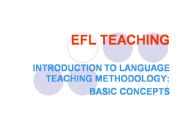
EFL Teaching
INTRODUCTION TO LANGUAGE TEACHING METHODOLOGY:
BASIC CONCEPTS
Level: advanced
Age: 14-17
Downloads: 56
|

Motivation and stimulation in language teaching
From motivation and stimulation parameters
of speech generation and reception to EFL teaching principles
Motivate any utterance (passive or active)
In case of no real-life motivation, suggest role-playing strategies
State the aim clearly in communicative terms.
Not necessary to explain the mo...
Level: advanced
Age: 14-17
Downloads: 50
|

TEACHING �WRITING �IN EFL �CLASSROOM Writing as communication
Types of writing
Writing can be expressive, poetic, informative and persuasive.
Depending on the type of writing, the writer concentrates either on the subject matter of the written piece, or on the reader, or on one�s own feelings and thoughts.
The triangle of the �subject matter�, �writer� ...
Level: advanced
Age: 17-100
Downloads: 48
|
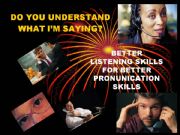
EFL TEACHING BETTER�LISTENING SKILLS �FOR BETTER�PRONUNICATION SKILLS
General features of teaching pronunciation
Teaching pronunciation is important not just because it is necessary to communicate one�s ideas clearly.
Articulation movements accompany the process of using the language not only when a person is speaking but also during listening, reading and writin...
Level: advanced
Age: 18-100
Downloads: 48
|
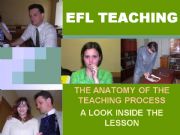
THE ANATOMY OF THE TEACHING PROCESS A LOOK INSIDE THE LESSON
Beginning � 400 words, BGS, BP, EVDT/S
Pre-Intermediate � 800-1000 words, BGS, EVDT/S
Intermediate � 1000-1500 words, CGS, MT/S
Upper-Intermediate � 1500-2000 words, CGS, MT/S
Advanced � 2000-2500 words, All GS, WET/S
Proficiency � more than 3000 words, All GS, AT/S
Sequencing and interrelat...
Level: advanced
Age: 14-17
Downloads: 47
|
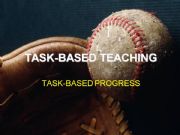
TASK-BASED TEACHING
Approaches to tasks classification
Do they teach to understand language use? - Informational
Do they teach to make effective use of language items? � Operational
Do they motivate the use of language for communication? � Motivational
Do they focus on form? � Non-communicative
Do they focus on...
Level: advanced
Age: 18-100
Downloads: 45
|
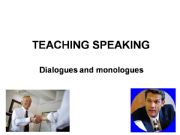
TEACHING SPEAKING Dialogues and monologues
Teaching dialogue means arranging a series of training exercises to master all of its possible components � lexical and grammatical models typical of real-life communication � and to train communicative reactions to what is heard
Modify and repeat
Learn and repeat
Answer together according to the...
Level: advanced
Age: 17-100
Downloads: 40
|
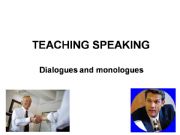
TEACHING SPEAKING Dialogues and monologues
Teaching dialogue is based on psycholinguistic nature of speech generation (production) and speech reception
A speech stimulus requires use of real communicative situations or invention of an imaginative one
Programming an utterance that includes the stage of structural analysis of the situation a...
Level: advanced
Age: 15-100
Downloads: 27
|
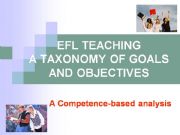
EFL Teaching a taxonomy of goals and objectives
SIX BASIC APPROACHES TO INTEGRATION
Action-based and action-driven teaching
Systemic teaching
Methodologies-based teaching
Concept and issue-based teachingepisteme)
Metoconcept-based teaching
Anthropological teaching
MODERN REQUIREMENTS TO
LESSON AIMES, GOALS AND OUTCOMES
Communicative s...
Level: advanced
Age: 14-17
Downloads: 25
|